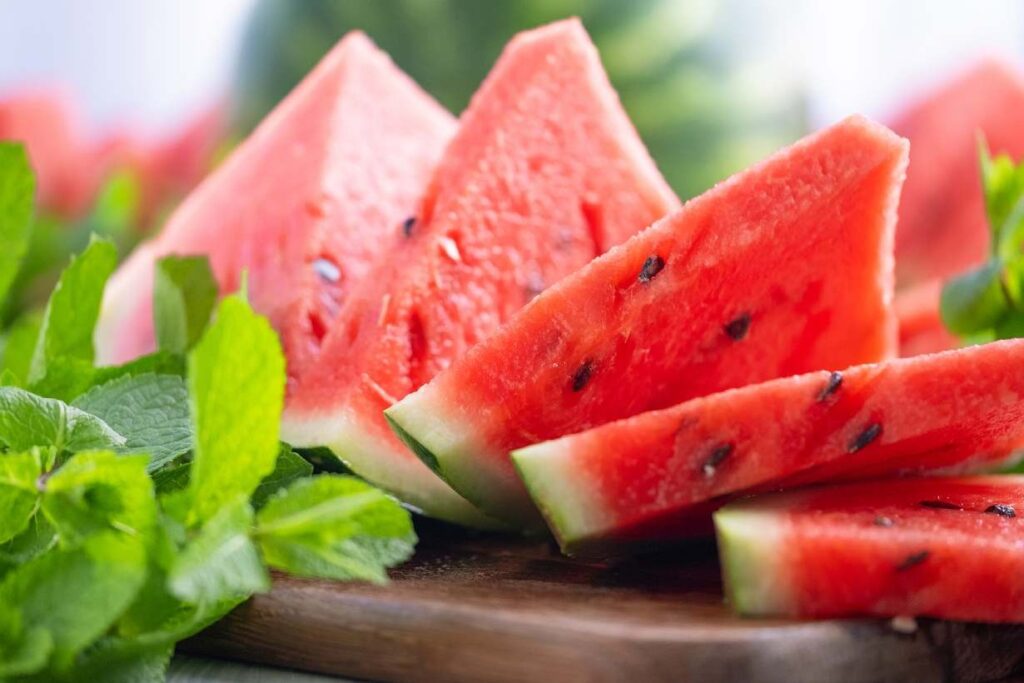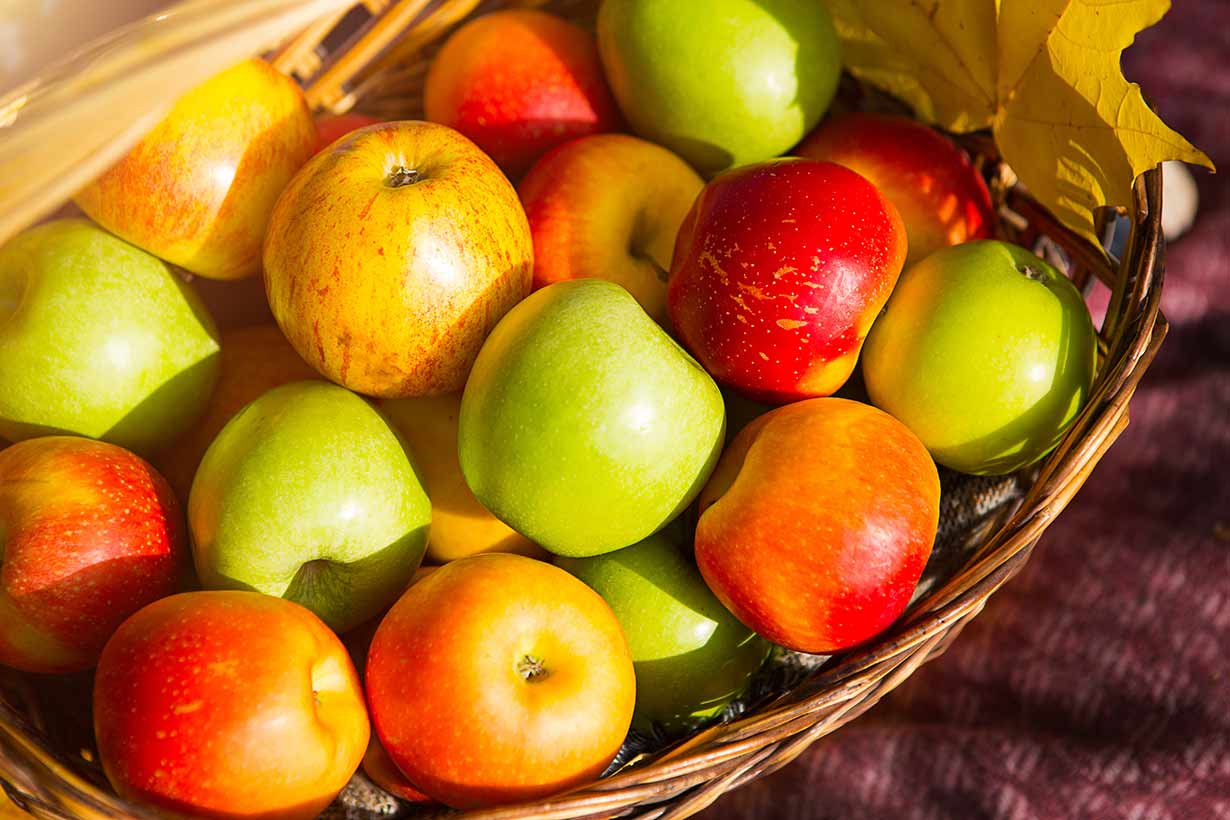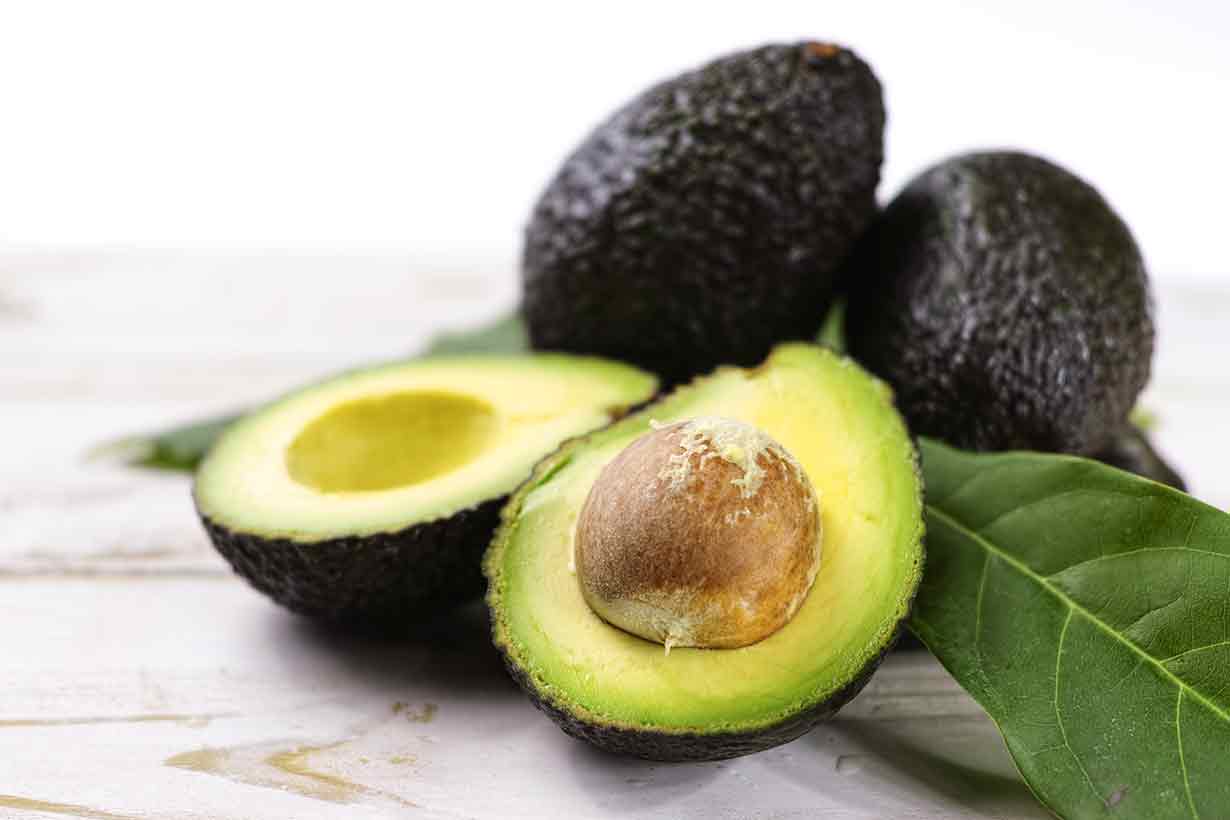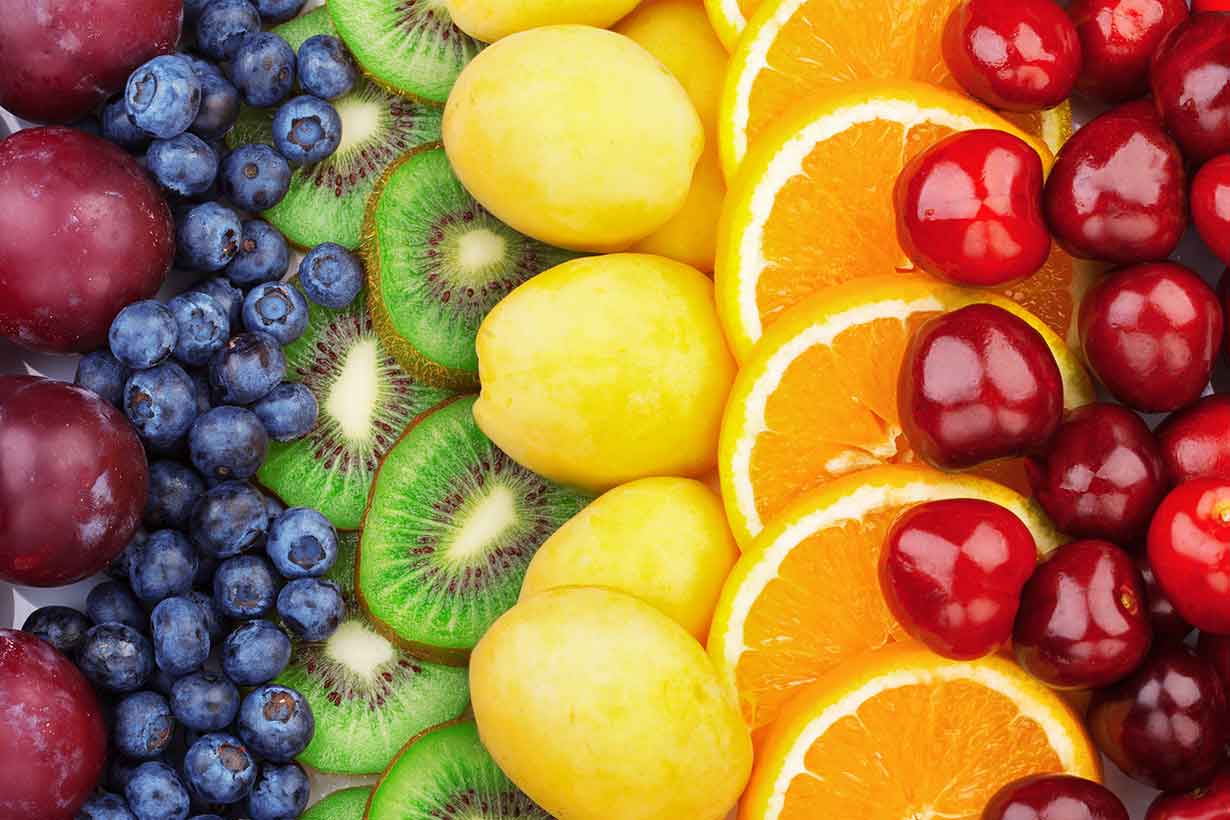Watermelon is a juicy and refreshing fruit with a high water content.
But what does it offer in terms of nutrients and benefits?
This article explores the scientific research on watermelon and its potential benefits, alongside a comprehensive overview of its nutritional profile.
Table of contents
Health Benefits of Watermelon

Some of the benefits that we can attribute to watermelon stem from its nutrient content, while others come from findings in scientific studies.
1) May Have Benefits For Heart Health
Several studies on watermelon have examined its potential benefits on cardiovascular function.
Blood pressure and cholesterol
First, a systematic review and meta-analysis published in 2023 reviewed nine randomized controlled trials on watermelon consumption (1).
The findings demonstrated that watermelon intake had a significant impact on decreasing systolic blood pressure, cholesterol, and low-density lipoprotein cholesterol (LDL-C).
Elevated systolic blood pressure and LDL-C levels are recognized risk factors for cardiovascular disease (2, 3).
Heart rate variability and arterial stiffness
Reduced heart rate variability (HRV) and arterial stiffness are also associated with an increased risk of cardiovascular disease (4, 5).
However, research suggests that watermelon intake can help improve HRV and arterial stiffness.
In a randomized controlled trial, consuming 500 ml of watermelon juice daily for two weeks helped reduce heart rate variability reductions in healthy adults when they took an oral glucose challenge (6).
This may be because watermelon increases the body’s nitric oxide production. This happens due to watermelon’s citrulline content, which converts to arginine in the body. Arginine is used by the body to make nitric oxide (7, 8). Nitric oxide can improve blood flow by widening and relaxing blood vessels (9).
Several other studies have demonstrated that watermelon intake reduces arterial stiffness, increases blood nitric oxide levels, and improves blood flow (7, 10, 11).
2) Watermelon is High In Vitamin C
A 286-gram wedge of watermelon provides 23.2 mg of vitamin C, which is 26% of the recommended daily value (12, 13).
Vitamin C has antioxidant properties and helps protect the body’s cells from damage (14).
Among its other benefits, vitamin C can also help enhance the uptake of non-heme iron, which typically has low bioavailability (15). Non-heme iron is the type of iron found in plant-based foods.
3) Good Source of Potassium
Among the essential nutrients it contains, watermelon is a good source of potassium.
Many people find it difficult to get enough potassium in their daily diet, which has led to the Dietary Guidelines for Americans recognizing the mineral as “a dietary component of public health concern” (16).
This designation has been made due to the widespread insufficient intake of potassium.
On the positive side, a 286-gram wedge of watermelon offers 320 mg of potassium, 7% of the daily value (12, 13).
Among its functions, potassium plays a vital role in blood pressure regulation. Systematic reviews show that increasing potassium intake lowers blood pressure, particularly in individuals with a high sodium intake (17, 18).
For extra potassium, combine watermelon with some other potassium-rich fruits such as avocado or banana.
4) Watermelon is Good For Hydration
As you might be able to tell from its juicy texture, watermelon is full of water.
In fact, the fruit is 91.4% water by weight.
This means a 286-gram wedge contains approximately 261 grams, or a cup, of water (12).
As a result, a wedge of watermelon can make a nice, refreshing snack on a hot day or after exercise.
The hydration properties of watermelon have been recognized by researchers, and some studies have been conducted on the topic.
In this regard, a randomized controlled trial involving trained cyclists found that watermelon consumption can support the energy demands of exercise, as well as increase antioxidant capacity and nitrate levels (19).
5) Contains the Antioxidant Lycopene
Watermelon is a good source of a carotenoid with antioxidant properties called lycopene.
Lycopene is found in red-fleshed fruits and vegetables, such as tomatoes, red peppers, and watermelon.
According to research, lycopene may help to protect against UV-induced damage, help protect cells from free radicals, and potentially lower the long-term risk of chronic disease (20, 21, 22).
A 286-gram wedge of watermelon contains around 13000 mcg of lycopene (12).
However, for those interested in lycopene, the best dietary sources are tomato-based products.
6) May Help With Weight Management
When trying to lose weight, research shows that foods with a high volume can have a “limited influence on hunger and satiety and subsequent calorie intake” (23).
While this effect may be small, it may still be helpful for some individuals.
A controlled clinical crossover trial published in 2019 tested whether watermelon would improve the satiety response compared to a typical cookie snack (24).
In the study, 33 participants consumed either 2 cups of watermelon (92 calories) or 92 calories of low-fat cookies daily for four weeks. Despite these two options having the same energy content, the watermelon group experienced weight loss and a reduction in body mass index compared to the cookie group.
One reason for this might be because, relative to cookies, participants reported watermelon provided greater fullness and a lower desire to eat.
The take-home point here is that consuming several hundred grams of watermelon may provide only the same calorie content as one cookie. However, the watermelon would likely result in a greater feeling of fullness, potential leading to a reduced food intake later in the day.
Watermelon Nutrition Facts
Let’s now take a look at the nutritional profile of watermelon.
The following data shows the full nutritional values of watermelon per 286-gram wedge.
Nutritional data has been sourced from the USDA’s FoodData Central database. Percent daily values are calculated using the FDA’s daily values, which are based on a 2000-calorie diet (12, 13).
| Nutrient | Amount | % Daily Value |
|---|---|---|
| Calories | 86 kcal | |
| Carbohydrates | 21.6 g | 7.9% |
| Fiber | 1.14 g | 5.7% |
| Sugars | 17.7 g | |
| Fat | 0.43 g | 0.6% |
| Saturated | 0.05 g | 0.3% |
| Monounsaturated | 0.11 g | |
| Polyunsaturated | 0.14 g | |
| Omega-3 | 0 g | |
| Omega-6 | 0.14 g | |
| Protein | 1.74 g | 3.5% |
| Cholesterol | 0 mg | 0% |
As the table shows, there are 86 calories in a 286-gram wedge serving of watermelon.
The fruit contains very low amounts of protein and fat.
Despite primarily being a source of carbohydrates, watermelon is not a significant source of fiber.
Vitamins
| Vitamin | Amount | % Daily Value |
|---|---|---|
| Choline | 11.7 mg | 2.1% |
| Folate, DFE | 8.58 mcg | 2.1% |
| Vitamin A, RAE | 80.1 mcg | 8.9% |
| Vitamin B1 (thiamin) | 0.09 mg | 7.5% |
| Vitamin B2 (riboflavin) | 0.06 mg | 4.6% |
| Vitamin B3 (niacin) | 0.51 mg | 3.2% |
| Vitamin B5 (pantothenic acid) | 0.63 mg | 12.6% |
| Vitamin B6 | 0.13 mg | 7.6% |
| Vitamin B12 | 0 mcg | 0% |
| Vitamin C | 23.2 mg | 25.8% |
| Vitamin D | 0 mcg | 0% |
| Vitamin E | 0.14 mg | 0.9% |
| Vitamin K | 0.3 mcg | 0.3% |
Vitamin C is the most concentrated vitamin in watermelon, followed by vitamin A and several B vitamins.
Minerals
| Mineral | Amount | % Daily Value |
|---|---|---|
| Calcium | 20 mg | 1.5% |
| Copper | 0.12 mg | 13.3% |
| Iron | 0.69 mg | 3.8% |
| Magnesium | 28.6 mg | 6.8% |
| Manganese | 0.11 mg | 4.8% |
| Phosphorus | 31.5 mg | 2.5% |
| Potassium | 320 mg | 6.8% |
| Selenium | 1.14 mcg | 2.1% |
| Sodium | 2.86 mg | 0.1% |
| Zinc | 0.29 mg | 2.6% |
Watermelon offers moderately high levels of the minerals copper, magnesium, and potassium.
Nutritionally Complementary Foods That Pair Well With Watermelon
Watermelon has either absent or low levels of the following nutrients:
- Fat
- Protein
- Calcium
- Vitamin B12
- Vitamin D
- Vitamin E
- Vitamin K
Based on this, here are some complementary foods to pair with watermelon to make it more nutritionally complete:
- Avocado: Offers high levels of monounsaturatred fat and vitamin E.
- Cheese: Provides high amounts of fat, protein, and calcium, and a moderate amount of vitamin B12.
- Almonds: Provide a good amount of unsaturated fat, a small to moderate amount of protein, and large amounts of vitamin E.
- Kale: Kale (and many other leafy greens) is an excellent source of vitamin K. Leafy greens typically provide a moderate source of vitamin E too.
- Oily fish: Oily fish options such as mackerel, salmon, and sardines are significant source of fat, protein, and vitamin D. They also contain a moderate amount of vitamin E.
Summary
Watermelon is a refreshing fruit that not only tastes great, but it’s also good for you.
As discussed in this article, the key nutrients in watermelon are vitamin A, vitamin C, potassium, B vitamins, and magnesium.
Aside from its nutritional content, research also suggests that watermelon may have benefits for heart health and satiety. The potential heart health benefits are due to its citrulline content, which converts to arginine, thus helping to increase nitric oxide production.
With only 86 calories in a large, 286-gram wedge serving, watermelon offers a lot of nutritional value for relatively few calories.








